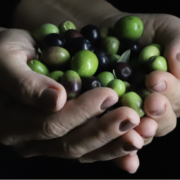Environmental impact
Environmental impact
“Improvement of the environmental impact” the O.P. intends to continue with technical assistance in the application of an integrated cultivation specification, compliant with the National Quality System for Integrated Production (measure 2B) and with the monitoring of the olive fly (measure 2C).
Measure 2B
The introduction, application, dissemination and surveillance of an integrated olive cultivation specification, drawn up in accordance with the SNQPI and the specifications of the Sicilian Region, has the purpose of encouraging the adoption of cropping systems with low environmental impact aimed at the organisation and management of the main agronomic techniques by combining physical defence tools, chemicals and agronomists in order to protect the environment and the olive grove agro-ecosystem.
Following the introduction of the specification, its correct application within the companies is ensured, through a service of targeted technical assistance which provides for the introduction of integrated control techniques against the main olive parasites (distribution of traps for monitoring pathogens, interpretation of results) as well as the use of rational fertilizations, thanks to the aid of chemical analyses on the soils and the drafting of fertilization plans.

Measure 2C
The main objective of this measure is to contribute to the reduction of the environmental impact of olive growing caused by chemical fly control, and subordinately ensure the improvement of the quality of the olive oil through a systematic monitoring of the pathogen and an efficient and timely warning system to farmers.
The measure also aims to achieve the following secondary objectives:
- an increase in the professionalism of olive growers through a rational use of pheromone traps to monitor the attack of the olive fly;
- an optimization of phytosanitary treatments;





